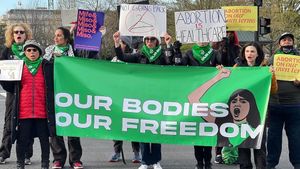The tragic case of Laken Riley has become not just another crime story but also a pivotal chapter in the national conversation surrounding immigration. The 22-year-old nursing student's murder has drawn widespread attention and intense debate, especially during the heated 2024 presidential election season. On November 20, 2024, Jose Antonio Ibarra, the man convicted of her murder, was sentenced to life in prison without the possibility of parole. This verdict followed his conviction on multiple charges, including felony murder, following the death of Riley on February 22, 2024.
Riley was found dead on the University of Georgia campus after failing to return from her early morning run. The details surrounding her death paint a grim picture; prosecutors presented evidence indicating Ibarra assaulted her as she jogged along the wooded trail. According to the prosecution, Ibarra saw Riley running and proceeded to attack her viciously, using a rock as the primary tool of his brutality, described during the trial as him "bashing her skull in with it."
The courtroom was filled with emotional reactions as the verdict was read. Family and friends of Riley broke down as they heard the judge confirm their worst fears. Ibarra showed no visible reaction, maintaining his stoic demeanor throughout the proceedings, which included testimony from more than twelve law enforcement officials and witnesses who detailed the harrowing events leading up to her death.
Riley's smartwatch data provided chilling insights about her final moments. The device recorded her heartbeat and indicated she had fought back, struggling for her life against her attacker. Just minutes after calling 911, her heart rate flatlined, bringing the desperate search for her to a tragic conclusion. Her body was discovered later, concealed with leaves less than 100 feet from where she had been jogging.
The aftermath of Riley’s murder took on new dimensions, as political leaders seized upon the tragedy to critique current immigration policies. Ibarra, who entered the country illegally from Venezuela, became emblematic of broader fears surrounding undocumented immigrants. His lawyers brought forth arguments linking his immigration status to the crime, sparking intense debates over border security. During this time, various Republican leaders, including President-elect Donald Trump, cited Riley’s death to argue for stricter immigration controls, often neglecting statistical evidence showing undocumented migrants are less likely to commit violent crimes compared to native-born citizens, as referenced by studies from the National Institute of Justice.
The courtroom trial began on November 15, 2024, after Ibarra waived his right to a jury, opting instead for a bench trial. This decision was made under the advice of his legal counsel, who expressed concerns about bias from potential jurors. The proceedings concluded with Judge H. Patrick Haggard delivering Ibarra’s guilty verdict shortly after final arguments had been presented by both sides.
Throughout the trial, the defense emphasized the circumstantial nature of the evidence linking Ibarra to the crime, proposing alternative explanations for key pieces of evidence. They pointed to the potential involvement of Ibarra’s brother, Diego, arguing he was more physically capable, which could have allowed him to commit the crime. This claim, coupled with their assertion of insufficient direct evidence connecting Ibarra to the murder, failed to sway the judge.
Victim impact statements from Riley's family painted her as more than just the victim of a senseless act of violence; they portrayed her as someone who radiated kindness, commitment, and ambition, encapsulating the devastating loss felt by those close to her. "Laken had a beautiful and bright future," her mother Allyson Phillips expressed, speaking about her daughter’s aspirations and her hardworking nature.
Politically, the case has been used as fuel by GOP candidates to push for hardline immigration policies. Trump, reacting to the verdict, took to social media, asserting, "It is time to secure our border and remove these criminals from our country so nothing like this can happen again!" Trump’s repeated usage of Riley's name on the campaign trail highlighted her death as part of his broader narrative against illegal immigration.
Georgia Governor Brian Kemp also chimed in post-verdict, asserting the justice rendered was both swift and severe. He criticized President Biden’s handling of border policies, linking the tragedy's circumstances to failures at the national level. "The policies are outrageous; they’ve caused people to die not only here but across the country," Kemp stated, voicing frustrations echoed by many conservatives.
This incident has not just underscored the legal consequences faced by Ibarra but also brought to light the moral and political dilemmas faced by society at large, as individuals increasingly grapple with the intersection of crime, immigration, and security. Riley’s tragic story remains etched on America's conscience, serving as both a wake-up call and rallying point for various factions throughout the nation.
While justice has been deemed served with Ibarra's life sentence, the broader discussions surrounding breaking the cycles of violence, immigration, and safety continue to reverberate across America. Advocates on both sides of the immigration debate remain divided on how best to approach these intertwined issues moving forward.



